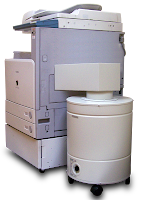 |
| Commercial cleaning involves more than slipping hazards: Harmful chemicals may affect the air quality. |
Standard commercial cleaning products fall in the harsh chemical category, meaning they contain volatile organic compounds (VOCs) that can become airborne and inhaled by building occupants.
They can not only contribute to poor indoor air quality and affect the people’s health, they can also be harmful to the environment and pollute groundwater.
It may be a better, safer and more cost-effective idea to go for greener industrial cleaning products.
A non-profit organization dedicated to setting standards for eco-friendly products/services/companies, Green Seal has established requirements for cleaning service providers, including in-house and external cleaning services, to create a green cleaning program that protects human health and the environment.
There are many ways facility managers and cleaning service providers can become greener.
- Cleaning products: Opt for environmentally friendly, green cleaning products whenever possible (general-purpose, floor, bathroom, carpet and all other types of cleaning agents).
- Chemical safety: Products with harsh chemicals need to be diluted properly, cleaners need to be trained properly and it’s a great idea to slowly phase out cleaning chemicals that may pose a risk to human health.
- Bulk purchasing: Liquid hand soap, paper towels, toilet paper, cleaning cloths and agents can be bought in large quantities to save on costs and packaging in the long run.
- Sanitation and disinfection: Use EPA-registered products for special areas that need disinfecting or sanitizing.
- Communicate: Good communication between cleaning personnel, facility managers and others involved is key to a safe and functional green cleaning program.
Source: Mother Nature Network, Green Seal guidelines
Reduce chemical pollutants in your facility
Electrocorp air filtration systems provide simple, cost-effective solutions to meet and exceed regulations and enhance a property’s environmental initiatives.
Our wide range of air cleaners feature advanced, proven technologies including deep-bed activated carbon, medical-grade HEPA and UV filtration to treat airborne chemicals, gases, odors and particles.
Using an industrial-strength filtration system at strategic points in the building can have a profound effect on the indoor air quality, reported health symptoms or complaints and perceived irritants.
Find out more about Electrocorp’s air cleaners for facility management or contact one of our IAQ specialists at 866-667-0297 for more information.




























